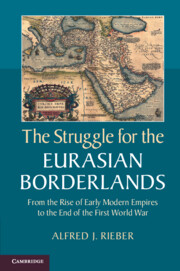
-
Select format
-
- Publisher:
- Cambridge University Press
- Publication date:
- 05 June 2014
- 20 March 2014
- ISBN:
- 9781107337794
- 9781107043091
- 9781107618305
- Dimensions:
- (228 x 152 mm)
- Weight & Pages:
- 1.18kg, 652 Pages
- Dimensions:
- (228 x 152 mm)
- Weight & Pages:
- 1.03kg, 648 Pages
You may already have access via personal or institutional login
Book description
This book explores the Eurasian borderlands as contested 'shatter zones' which have generated some of the world's most significant conflicts. Analyzing the struggles of Habsburg, Russian, Ottoman, Iranian and Qing empires, Alfred J. Rieber surveys the period from the rise of the great multicultural, conquest empires in the late medieval/early modern period to their collapse in the early twentieth century. He charts how these empires expanded along moving, military frontiers, competing with one another in war, diplomacy and cultural practices, while the subjugated peoples of the borderlands strove to maintain their cultures and to defend their autonomy. The gradual and fragmentary adaptation of Western constitutional ideas, military reforms, cultural practices and economic penetration began to undermine these ruling ideologies and institutions, leading to the collapse of all five empires in revolution and war within little more than a decade between 1911 and 1923.
Awards
Winner, 2015 Bentley Book Prize, World History Association
Reviews
'A compelling demonstration of the central importance of borderlands and frontier disputes in Eurasian states. Its broad comparative sweep provides insights not only into the sources on international conflict, but also into the dynamics of internal reform enacted to bring borderlands more effectively under central control.'3
Richard S. Wortman - Bryce Professor Emeritus of European Legal History, Columbia University
'This volume is an impressive feat of dedicated scholarship. Employing a mode of analysis that he calls 'geo-cultural', Alfred J. Rieber interprets the political and social history of Eurasia as a story in which certain frontiers play an absolutely essential, indeed informative role. It is safe to say that people who read this book will never see frontiers in the same way as before.'
Ilya Vinkovetsky - Associate Professor of History, Simon Fraser University
'No-one who reads this book can fail to gain new perspectives on much of modern history, not to mention the constant crises of both Europe and Asia today.'
Source: The Times Literary Supplement
'Borderlands are back. From the Baltic to the Balkans, from Ukraine and the Caucasus through Central Asia, old fault lines from old empires have once again taken on political relevance in world politics. Alfred J. Rieber’s ambitious book looks at their formation and interaction with five imperial centers over five centuries through a study of the Habsburg, Ottoman, Russian, Iranian, and Chinese empires.'
Thomas J. Barfield Source: American Historical Review
'[Rieber] has produced an encyclopedic political history of mid-fifteenth- through twentieth-century Eastern Europe and much of Asia (except for the Arab and Indian worlds), with many forays into the Middle Ages and an emphasis on the period since 1815. The book includes an imposing wealth of factual material and comparisons, and a vast array of footnotes covering secondary literature in many languages on practically every important question related to the rise and decline of empires.'
Seymour Becker Source: Ab Imperio
'What is new about this book is a holistic vision of patterns of conflict determined by the existence of complex, interconnected and fluid frontiers … In its broad territorial and chronological span as well as its rich tapestry of historical detail, the book is written in the worthy tradition of the École des Annales … This should become a standard work, equally insightful for the academic specialist and for students of history.'
Irina Marin Source: The English Historical Review
'This is an impressive, complex, and comprehensive work that reflects a lifetime of scholarly study. It is also a study that focuses on borderlands within continental empires that, at least in the historiography of the modern era, tend to play a subordinate role to European overseas empires. For this reason alone, it is a refreshing approach to the broader subject of empire and borderlands.'
Jonathan E. Gumz Source: Journal of Modern History
Contents
-
1 - Imperial space
pp 5-78 -
-
- You have access
- Export citation
-
Metrics
Altmetric attention score
Full text views
Full text views help Loading metrics...
Loading metrics...
* Views captured on Cambridge Core between #date#. This data will be updated every 24 hours.
Usage data cannot currently be displayed.
Accessibility standard: Unknown
Why this information is here
This section outlines the accessibility features of this content - including support for screen readers, full keyboard navigation and high-contrast display options. This may not be relevant for you.
Accessibility Information
Accessibility compliance for the PDF of this book is currently unknown and may be updated in the future.


